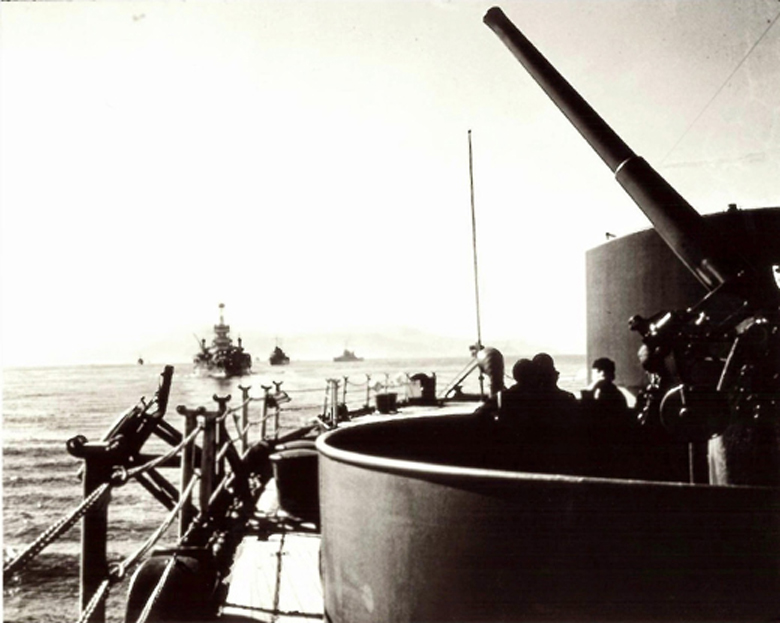Air Operations, Europe
There is a heavy night bombing raid on Southampton.
[Battle of the Atlantic
A powerful naval task force lands US Marines in Iceland to relieve the British garrison there. Marines also arrive in Trinidad and British Guiana to supplement and eventually replace the British forces in those two locations. The US states that the move is made to prevent 'the occupation by Germany of strategic outpost in the Atlantic to be used as air or naval bases for eventual attack against the Western Hemisphere.'
[Diplomatic Relations
Churchill sends a letter of encouragement to Stalin in which he speaks of 'utterly unprovoked and merciless invasion of the Nazis'. He adds that 'the longer the war lasts the more help we can give', suggesting that Stalin must fight his own battles while Great Britain attends to its own priorities. By this time, however, the Soviet defenders have been pushed back between 200 and 400 miles from their first positions; the Baltic states, White Russia and the Ukraine are severely threatened.
[Eastern Front
German pressure continues from the Baltic to the Black Sea, while mopping-up operations liquidate the pockets in which huge Soviet forces have been trapped.
FINLAND AND NORWAYThe 52nd Rifle Division repels a heavy attack of Dietl's Mountain Corps on the Litsa. German forces are just 50 kilometers away from Murmansk. The XXXVI Corps launches strong attacks upon Salla and, after a fierce battle, takes the town. Repola falls to the 14th Finnish Division.
NORTHERN SECTORThe XLI Panzer Corps overcomes the XXIV Rifle Corps barring its way at Ostrov and advances north along the Velikaya toward Pskov. The I Corps advances rapidly behind in support of the panzers.
CENTRAL SECTORElements of the 20th Panzer Division crosses the Dvina at Ulla. After a furious battle, Soviet counterattacks are repulsed. The 19th Panzer Division is struck by heavy Soviet attacks out ot Polotsk and becomes involved in heavy fighting. The 7th and 12th Panzer Division of the XXXIX Panzer Corps attack the junction of the 20th and 22nd Armies, a move which causes Eremenko to order Koniev's 19th Army to move up to Vitebsk.
As these battles rage, Guderian moves his XLVII Panzer Corps north to protect his left flank against the increasingly violent Soviet attacks at Senno. A little to the south, the XXIV Panzer Corps captures Bortniki as it extends its hold on the west bank of the Dniepr. Between the two corps the XLVI Panzer is establishing strong positions.
SOUTHERN SECTORThe 16th Panzer Division of the XLVIII Panzer Corps is involved in pitched battles with Muzychenko's 6th Army near Starokonstantinovka. The 11th Panzer Division captures Berdichev after a brisk battle.
By this stage of the battle, the Southwest Front has been reduced to 627,000 effectives, deployed between 20 rifle, 1 cavalry, 4 motorized and 13 tank divisions and 6 tank brigades.
On the southern wing of the combat front, the 18th Army is involved in heavy fighting with elements of the XXX Corps at Mogilev Podolski. The XLVIII Rifle and II Mechanized Corps continue to counterattack northeast of Kishinev, joined also by the II Cavalry Corps. Amid heavy fighting, the LIV Corps pushes back the exhausted Soviet units, inflicting further heavy losses upon the already weakened divisions.
[Iceland
In agreement with the British government and the local authorities, American forces land on the island to take over the task of garrisoning it and protecting nearby shipping from submarine attack. The US troops are from Brig-Gen John Marston's 1st Marine Bde and the transport ships are from Rear-Adm David M. LeBreton's TF 19, which also includes 2 battleships, 2 cruisers and 12 destroyers. Roosevelt justifies the operation by the necessity of defending the western hemisphere.
Atlantic Fleet in Iceland, 7 July 1941 |
 |
Occupied Greece
King George and the Greek Royal Family arrive in South Africa.
[